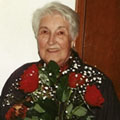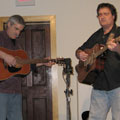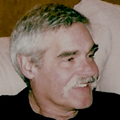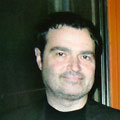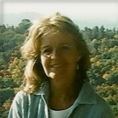My Life at Triumph Explosives
By Eva Brooks Campbell
May 2009
When I was 20, having noticed that the amount of my funds had dwindled alarmingly—in other words, I was broke—I decided to get a job.
I lived in Sparta, North Carolina, and my aunt Maggie had been writing, urging me to come to Maryland to get a job in a powder plant and live with her, her husband Barney, and son Fred. So, I decided to do that. I gave no thought to what a powder plant would be like, nor did I realize they had the bad habit of blowing up ever so often. But, first things first. I packed. One piece of luggage and a purse. Bought a one-way ticket from Sparta to Oxford, Pennsylvania, the closest bus stop to where Maggie lived.
At that time a bus line came through Sparta each day—a late evening stop. I waited with cousins in their jewelry store, Louise and Cliff Evans. My future came rolling into town in the form of a big red Trailways bus, which I, with pounding heart and shaky hands, climbed into and left my family and lots of relatives and the mountains I dearly loved.
That was a long trip—the rest of that night, all next day, and till early evening the next night. We stopped at every town, village, and crossroads, or so it seemed, to pick up people and let people out. And, to really end it pitifully, there was no one there to meet me when we arrived in Oxford.
I didn’t know what to do. I decided to go into the Octoraro Hotel. They were nice but couldn’t help. No taxi service. Just as well. I didn’t know where my aunt and uncle lived anyway. They had no phone. I had a neighbor lady’s phone number, so I called her but got no answer. Not knowing what else to do, I asked about a room. All rooms had already been rented to defense workers. Finally, they agreed to let me sleep in the room of a girl who was staying there, as she had gone home for the weekend. I felt thankful.
I was very tired and also very nervous. I had never before been so far away from home by myself. Everyone was very kind though and as helpful as they could be. I was up early the next morning and phoning the neighbor again. She answered this time and said she would go tell my relatives that I was at Oxford. She did, and my aunt and uncle came right up to Oxford to get me. It was so good to see them. They said they had not received the letter I had sent telling them of my arrival time.
My aunt Maggie was a dear lady and, having no daughters, she was especially glad to have me. We did a lot of talking with each other. Since this was during World War Two, they were living in a converted chicken house near Bay View, Maryland. At that time, during that war, people would live practically anywhere to work at the well-paying defense jobs. Maggie had made the chicken house pleasant and attractive. I was by there recently and noticed that people are still living in it.
My uncle Barney and cousin Fred both had jobs in powder plants. Maggie’s family had had a nice home in North Carolina, but there were no jobs there, so they had moved to Maryland to find work.
After I had rested a couple of days, I went to apply for a job. Maggie’s friend, Bessie Watson, her husband Clayton, and daughter Regina took me to sign up. We had no trouble, since they were hiring everyone it seemed. Regina was a couple of years younger than I was and we became good friends. Her parents were really nice and helpful.
Barney, Fred, and I were each on a different shift at work. Maggie said we drove her crazy cooking for different shifts and caring for all of us. Fred and I had some nice times together, going to the movies.
So I had a job—inspector on a detonator line. The little detonators we inspected were put in the nose of the 40-millimeter shells we were making. We sat on tall wooden stools surrounded with a thick-sided metal cage that was even with our heads. One worker filled each detonator with powder, three different kinds, and then passed it through a hole in the metal wall to the inspector. To inspect the tiny detonators as they came down the line, we had to use our hands behind thick panes of glass that stood in front of us. The glass barrier was maybe an inch thick and taller than our heads, to protect our faces. We put our hands around the sides of the glass to inspect.
The detonators were put on thick pads of white cloth, only a few at a time, six or so, I forget, and we had to shake the pads outside every so often to rid them of any loose powder. We picked each detonator up separately and checked to see if it was filled correctly with powder and assembled right. You had to touch them gently so the powder would not explode.
The company wanted us to wear their uniforms, hats, safety shoes, etc., but we didn’t. We provided our own slacks and shirts. I did buy the shoes but never could wear them. They didn’t fit my feet, and the metal toes were so hard and cold. We were supposed to wear our head covered, also, but no one did.
While I was working in the detonator area, a few of them blew up on my hands. Maybe I had allowed too many behind the glass or something, but whatever caused the explosion, it wasn’t anything different from what I been doing all along. Powder is tricky; sometimes it would just blow.
It made an awful noise that echoed throughout the large building. The set-up men came running. One big man grabbed me and rushed me to the first aid section, where the nurse bandaged my arms, shoulder to hands. I had to lie down for a while. I was bleeding a little from skin wounds, and my hands were blackened from the powder. The detonators were encased in very thin aluminum, so, fortunately, it didn’t penetrate deeply into my arms. It left scars for a while. They finally faded.
My boss said I could come in to work, but I should just sort of stay out of the way and no one would bother me. I did that for a while, but I was soon working again.
The bosses blamed me for the explosion, but I don’t know. Some powder is just very sensitive. One powder, if it got too dry or too damp, would blow. Another powder that the girls handled would turn their hair and skin an odd shade of orange. I wasn’t afraid in the plant though. I just didn’t think about it.
One of the girls I worked with did get killed. She was carrying quite a few boxes of detonators from one building to another—several small trays in a carrier. There were enclosed boardwalks between the buildings. The boardwalks had blankets in glass containers spaced along the walls to cover people who were injured.
The detonators blew on the boardwalk between 419, my building, and the cafeteria. Most everyone ran out to see. Not me. I knew her. Her name was Evelyn, a really nice girl from West Virginia. How awful for her parents to be told. I guess they used one of the blankets to cover Evelyn.
We had a few big explosions at Triumph and quite a few were killed, but no one else in my area.
After a while, so much open powder was making me feel nauseated, so I asked for and got a transfer to another area. I learned to run a small machine that made sure that the detonator was armed. I liked this job. Our line was the most productive in the building.
I liked most of the girls I worked with. They were from West Virginia, Pennsylvania, a few from Delaware, but West Virginia mostly. I began to sing a song or two at night while we worked. Sometimes the girls would ask me to sing and I enjoyed that.
One lovely older lady from Delaware asked me where I learned the songs I sang. My Dad, I told her. He used to sing old songs, like “Two Little Girls in Blue” and “Home Without Love,” and some he had learned when he was out West, like “Letter from Home, Sweet Home” and “Streets of Laredo.” I liked to sing, and it made the time pass more quickly.
When the plant closed, I expected go back to North Carolina, but I’d met this big, handsome guy and we were making other plans. So, I have made my home here in Maryland.
